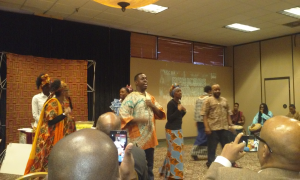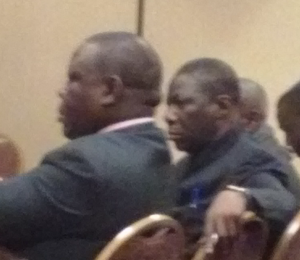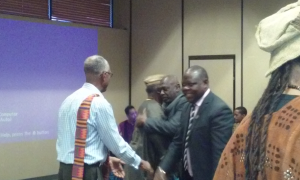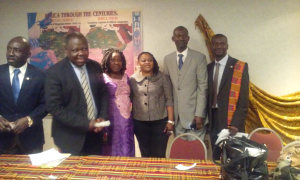Setting the Stage for Increased Diaspora Cooperation with the African Union
November 27, 2015
“[T]he Economic, Social and Cultural Council [is] the organ that deals with civil society in the African Union. They deal with non-state actors. … Your presence here is like a seat at the table, so I want to thank the Economic, Social and Cultural Council for making that happen.” Dr. Jinmi Adisa, the Director of the Citizens and Diaspora Organizations Directorate (CIDO) of the African Union’s Economic, Social and Cultural Council (ECOSOCC) welcomed Pan-African activists from Africa, the United States, the Caribbean, Latin America, Europe, Asia and Australia to the Global Africa Diaspora Convention that was held from November 19 – 22 in Washington, DC and Baltimore, Maryland.
Dr. Adisa and his immediate supervisor, Dr. Joseph Chilengi, the Presiding Officer of ECOSOCC, had come to the Baltimore-Washington area to participate in a series of meetings and discussions designed to introduce African Descendants and Continental Africans to the AU’s efforts to connect with the 300 million-plus people of African descent who live around the world outside the Continent of Africa.
After a Welcome Reception that was held on the evening of Thursday, November 19 at the African Union Mission in Washington, DC, the venue changed to the Best Western Hotel and Conference Center in East Baltimore for two days of plenary sessions and breakout conferences that were centered around specific aspects of African Diaspora involvement with the AU, including women, youth, the nature of the African Diaspora, research, academics, business, economics, culture and the arts.
The weekend was capped by an Interfaith Service at Metropolitan AME Church in Washington, DC on Sunday, November 22. The weekend was organized by the African Union ECOSOCC Special Adviser on Relations with the Diaspora, Ms. Evelyn Joe.
For those who might have felt the African Union had no interest in engaging with the African Diaspora, including African-Americans and other African Descendants around the world, this Convention was a welcome reminder of the invitation the AU issued in 2006 for the Diaspora to become involved in “the building of the African Union.” This weekend should serve as a springboard for several initiatives being promoted by African Diaspora organizations for economic development and grassroots representation for the Diaspora in the AU. Dr. Chilengi stressed, “the Diaspora as a region needs to put in place your framework mechanisms for ensuring that you play your role insofar as The Africa We Want is concerned. … We need the skills and the resources of the Diaspora.”
Below, we include the opening statements by Dr. Adisa and Dr. Chilengi. The summary of this article appears on the website http://www.bmoreblack.com, and the full article also appears on the website of the Sixth Region Diaspora Caucus (http://www.srdcinternational.org).
Friday, November 20, 2015
Morning Session
Dr. Jinmi Adisa
Director, Citizens Directorate (CIDO) of the African Union ECOSOCC
“The African Union says it’s people-centered. But then, if it’s so, we must listen to them. So actually, the whole purpose of this is to come and listen. And then, the Economic, Social and Cultural Council and its various organs, that’s the organ that deals with civil society in the African Union. They deal with non-state actors. … One of the fundamental things you can be assured is that whatever you say here, whatever you agree … will be taken directly. … It will go to ECOSOCC, they will examine it and make their recommendations. … Your presence here is like a seat at the table, so I want to thank the Economic, Social and Cultural Council for making that happen. I want to thank Ms. Evelyn Joe. She is the Special Adviser here and I think she has gone to a lot of effort. … In the process of doing it, of course, we clash, but that’s to come together and make something good, and I think in the end she’s got it right, and I want to commend her enterprise and zeal in making this happen.
“I’m also very glad to be here to see some very important people, like some of my icons like [President of the World African Diaspora Union] Professor [Leonard] Jeffries here. … There was a visit to Addis Ababa in which he gave us some documents that we’re trying to put together [for] a Diaspora Library so that those of us who are walking free and doing things and going to school and making noise can understand the sacrifice that people like Professor Jeffries have put in to get us where we are. I want to acknowledge Professor Jeffries. [He is] an inspiration to me. I look up to people like him.
“I get a lot of criticisms. That’s the nature of my job. I’m supposed to deal with the Diaspora. And I say where is it coming from? From our people, yes. I could do better. I’m not perfect. I make mistakes, like everybody else. Whenever I see a criticism coming from somebody like Professor Jeffries, I say ‘This is serious’. …
“Be rest assured that all your sacrifices and efforts [are appreciated]. In your family, you have to fight. But that is because we are family. We have a sating that if two brothers sit under a tree to discuss family matters and they come out laughing they are not telling the truth to themselves.”
Dr. Joseph Chilengi
Presiding Officer, African Union Economic, Social and Cultural Council (ECOSOCC)
“Good morning ladies and gentlemen.
“I grew up in an African way and I spent a lot of time with my grandfather and grandmother, and they shared with me a lot of things. And the poem and the ways that were expressed a few minutes ago [a very spiritual and emotional poetry, spoken-word and dance performance by Baltimore-based cultural artists], by our colleagues in front of us here … I’ve never known myself to be strong, but I made myself strong today. I think that is a first step of courage, because such situations usually break me down. I think that I need to ask you that we acknowledge and appreciate the message that was given today. …
 “I think also that it’s a great honor to come and sit with ourselves here as Africans and share our impressions, our potential direction and our potential challenges and out potential solutions to what Africa wants to be. The slogan now on the Continent is ‘The Africa We Want’. And the Africa we want shall be defined by ourselves, determined by ourselves, driven by ourselves and delivered to generations to come and to ourselves by ourselves.
“I think also that it’s a great honor to come and sit with ourselves here as Africans and share our impressions, our potential direction and our potential challenges and out potential solutions to what Africa wants to be. The slogan now on the Continent is ‘The Africa We Want’. And the Africa we want shall be defined by ourselves, determined by ourselves, driven by ourselves and delivered to generations to come and to ourselves by ourselves.
“This, therefore, means that all of us here, including yourselves, are diplomats of the African Union, you are ambassadors of the Union in your own selves, individually, collectively, institutionally, and also through collaboration with other stakeholders. Because you have to tell the African story of the Africa you want. You need to determine the aspects of the Africa you want, you need to deliver to Africa and Africans the Africa You Want, and no one else can tell the story for us. We have to tell the story.
“And this story is toward the Agenda 2063. Agenda 2063 is a framework mechanism in which we are saying as Africans, fifty years from now, this is the Africa we want. In terms of its transport network, in terms of its energy sufficiency and capacity, in terms of human resources movement, in terms of its operations in science, technology and space, in terms of a governance framework, in terms of human rights process, in terms of overall human rights and the Human Development Index of all Africa. It is within this Agenda 2063 that the aspirations of the Diaspora are also situated. In 2012, we met in Sandton [South Africa, for the 2012 Diaspora Summit], I recognize a few faces. A colleague seated here, I can never forget your face. And a few others. We met in Sandton. [Several of] our Ministers and our Heads of States joined us and came out with a Declaration, which legally recognizes the Diaspora as a region of the African Continent wherever every African is situated. And that is the Declaration that brought into place the Sixth Region of Africa. So the Sixth Region of Africa is the African Diaspora Region. We are all aware we have ECOWAS, the West African Community, we have SADC, we have the East African Community, we have North African Community and … five [regions] constitute the African Continent in terms of political configuration. But the Sixth Region of Africa is the Diaspora.
“… the Sixth Region of Africa is the African Diaspora Region.”
— Dr. Joseph Chilengi
“What does this entail? It means the Diaspora as a region needs to put in place your framework mechanisms for ensuring that you play your role inasfar as The Africa We Want is concerned. It’s not an Africa of criticism. It’s an Africa of aspirations. An Africa that has acknowledged, and that has identified the limitations we have now in all spheres of human endeavor, and decided to define in each sphere the direction we want to take and where we want to go, and you have to be part of this aspiration. But most important and most critical is this: that you are not in Africa. You are outside the boundaries of Africa. And therefore, if you are outside the African boundaries, then you need to defend Africa’s interests. You need to defend Africa’s interests. You are the first frontline soldiers in Europe, in America, in Asia, in Australia, in the Middle East. You are the first line soldiers. If you get defeated here, we get defeated in Africa. And hence, we travel kilometers. … [T]he reason we’re coming here, leaving everything behind, is because of the importance we attach to you. … You have an important role to define and influence [the] American Senate, to influence the American Administration, the Australian, the European Union, that their policies and programs, the way they see Africa is not the way you understand it. You are the chief advisers in your spaces because you understand Africa better than they do.
“In order to be an effective diplomat, an ambassador of Africa, we then need to sharpen out engagement skills. The way we engage will determine our results. Africa has been known to be a ‘Dark Continent’, but Africa is awakening. In the Africa We Want, we make it very clear now. Some of you are aware that Africa was in Valetta [the Summit on Migration in Valetta, Malta, November 11-12]. Before we were in Valetta, me, Dr. Adisa and others were in Brussels. Before the heads of state were going to the Migration Summit in Valetta, we discussed with our European colleagues and we told them the truth of the situation and the challenges. My country, Zambia, for example, hosted 1.2 million refugees. We didn’t press a button or assignment yo get heads of state to come and discuss that. We used our obligation within international law, human rights law and refugee law to respond to that. Kenya is currently hosting millions of refugees. Tanzania did more than a million refugees, as many other countries in Africa. And we advised them. We’ve got the experience. We’ve gone through it. Listen to us. They didn’t listen. The following policy of the Continent has officially changed: Anything that is not of interest to Africa, we say no.
“Heads of state went to Spain in numbers two weeks ago and they were told ‘We’ll give you so many billions of euros and you need to do this and this’ and we said ‘Keep your money.’ And our response at that Summit was a resounding ‘No’ to the proposals that were made by the European Union. What we said was: ‘We’ve got the experience in dealing with refugees. Come to us and we’ll give you guidance. Don’t give us money. We’ve got the brains, and our brain is our major resource.’ That is the way Africa is moving. Africa is moving in a direction that some of you may not know. Our children have been crossing dangerous waters into European space, at all costs. We don’t like it. Because, and we have always told the Europeans and other West African countries, every day they sing like Europe is heaven, America is heaven. I tell them, if it is heaven, I’d want to go to heaven at any cost. There are pastors here. And if it’s going to heaven, I’d do anything I can do to reach heaven, just like you aspire to reach heaven. If you begin to indoctrinate our young children that Europe is heaven … tell them the hope that is in Africa. That the train they are seeing here is also coming to Africa. Ethiopia is one such country I have seen. … Africa has signed an agreement with China to develop a fast train network from Cairo [Egypt] to Cape Town [South Africa]. It was signed last year in August. And Ethiopia has come out. Egypt will soon come out. Nigeria will come out. Zambia will come out. Everyone will come out. South Africa has already come out. Kenya will come out. In the end, we will have a connectivity within Africa using the same train. That’s what our children want.
“We are working within our Agenda 2063 to address our energy deficiencies. The amount of development in Africa does not match our energy capacity. We are working on the Inga Dam [actually two hydroelectric dams connected to one of the largest waterfalls in the world, Inga Falls, located in the western Democratic Republic of the Congo, 140 miles southwest of Kinshasa]. It produces two million milliliters of water per day. And therefore it can [produce] sufficient energy capacity for Africa and the entire Europe and America. We already signed an agreement to have that energy hub come up in Africa.
“Within Agenda 2063, we have said ‘No’ to aid and conditionalities. We have told all partners that want to engage with Africa that the issue of aid and conditionalities belongs in the dustbin. If you want to engage with Africa, you go for mutual accountability. Give us money if you so wish, but when you get natural resources also from Africa, we want to know what you are using them for. If you get coltan from DRC, let’s make sure they’re not making the guns to send back to DRC [to kill us with]. If you’re getting our timber, make sure that that timber is not being used in order to come back and exterminate life in Africa. So we have set the agenda straightforward. And the message they’ll be getting is that Africa has become stubborn, and please accept we are now becoming stubborn. Because we know what we are doing.
“We are finding it difficult for us in every space. We have the minerals. We have the natural resources. We’ve been bossed. They took it in the past. We benefited nothing. Now our eyes are open. We know that our generation is [aware], our children and our grandchildren. We are now saying, ‘These minerals are not for anyone else. They are for us. If you give us conditions … we go to China.’ China is a good buddy. Yeah, we don’t talk for a long time. … We are not interested in sitting with people who tell us, ‘You know, your human rights, and wah, wah, wah, wah. …’ First, we know people need water. When they have it, that is their right. People need roads. When they have it, that is their right. And those of you that have been to Africa now, every country that you go to, every country in Africa is a construction site. It is a construction site! My son, who recently came to Lusaka [Zambian capital city] from school, when he arrived in Lusaka said ‘Wow, Daddy! Wow!’ I said ‘This is what we are doing for you. This is Africa.’ The roads are being done, everywhere. … This is Africa. We are moving.
“… what needs to be done is to seek to achieve the Diaspora Initiative.”
“So all these are situated within Agenda 2063. Now, there are five Legacy Projects that are made for you. … We are just coming from a [Zambian] Diaspora conference organized by my government in my country. And they have just issued [a directive] – you know, we are a copper mining country – one of the biggest mines of the state, don’t sell shares to anyone outside of Africa. So, all of those shares have been offered through the Stock Exchange only to be sold to Zambians and Zambians in the Diaspora. …
“So that is the Africa we are working on. And this Africa we have to work on cannot be done with us only inside the Continent. You are critical players. … You know, we are changing. … We want to move. Problem is we don’t have time. We don’t have time. I don’t have time myself to want to sit with the European leadership … for the whole day. No, I want to go and sit with China for thirty minutes and … the road is being done in my country. And therefore we need the skills and the resources of the Diaspora. We need them. There has been an argument that the remittances are more than the foreign direct investment. Yes, but those are private remittances. We need investment from the Diaspora. Investment that will grow the economy. You have grown your families. You have built homes I know. You have brought in vendors, I know. Now, can you build their factories where they are going to work? So we need the resources. We need the skills.
“That is why Dr. Adisa is here. … Did he share about the Africa Diaspora Corps? Volunteer Corps, focusing on the youth. That the son of Professor Jeffries, who is here, if he’s studying medicine at Johns Hopkins University, when he stands for internship let him come to Africa, in a hospital in Africa. And when they are in Africa, opportunities will come up. They will love it. They will love Africa, they won’t want to come back. Let the new generation come and look after the Africa We Want. Because it was meant for them. The focus is on the youth.
“And therefore the resource base is on the youth. The focus is on the youth. I’ll be meeting some colleagues from the White House. … They do a Nelson Mandela Fellowship [here]. … So after their fellowship where do they go? You send them to Africa, they go to sleep. We don’t want that. Can we discuss some way to use that talent? When they learn those leadership skills, we want them to enter the African Union, ECOSOCC, Pan African Parliament, the Commission for Human Rights, CIDO. … So we want those skills, and several other things.
“If I wanted to talk, I’d talk for the whole day. But since I came a long way, I have to throw a challenge to you, and to ourselves. What is it that remains to be done? Now, in order to enter you into the future of our Continent that we want. Those of you who are following foreign policy, everywhere we go, we are taking all international positions, [and] we are defeating them. That is our strategy. … We are fifty-some countries in the United Nations in New York. When you add China there, and you add Russia there, we become a good strong voice.
“So what needs to be done is to seek to achieve the Diaspora Initiative. We need to operationalize it. It has been on paper, two-three years now. We can’t be leaving things on paper for such a long time. That is not the Africa approach we have now. Now we are in a hurry. Don’t slow us down. This Africa Diaspora Initiative is your Initiative. It is our Initiative. It cannot be done by us alone. We need to join forces with you. Let’s move quickly and operationalize the African Diaspora Initiative.
“And let’s shift the paradigm of African Diaspora participation in African economic growth. Your politics are economic politics. Economic politics, that’s what we want to hear from you. So the paradigm shift remains with you. But it requires a lot of organizational capacities. Africa is not a small country. Africa is diverse, from Arab to Francophone, to Anglophone, to Bantuphone, to Afrophone, to whatever phones we have, Africa is diverse. And therefore it requires the organizational capacity. These structures which you have … can we work to strengthen them, so that they can respond to the challenges of Agenda 2063? And 10 to 15 years from now, 50 years from now, watch Africa, how it’s moving. Forget about the negative stories you are hearing. Just watch the development aspects of Africa. You will be amazed, I’m telling you. If you go to Ethiopia, there is no foreign bank in Ethiopia, you know that. … If you go to Kenya, same. So we are slowly taking control of the situation. And when we close the African space … where will the other banks go? They have to [go] back to where they come from, or they play our game inside Africa. I thank you so much.”



